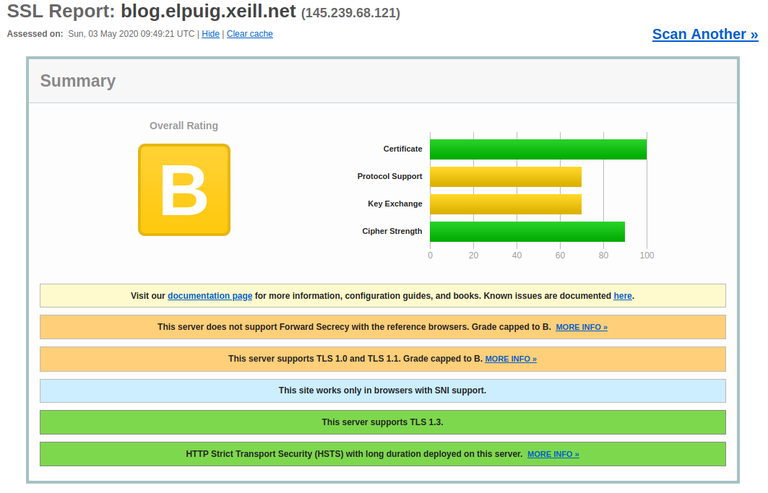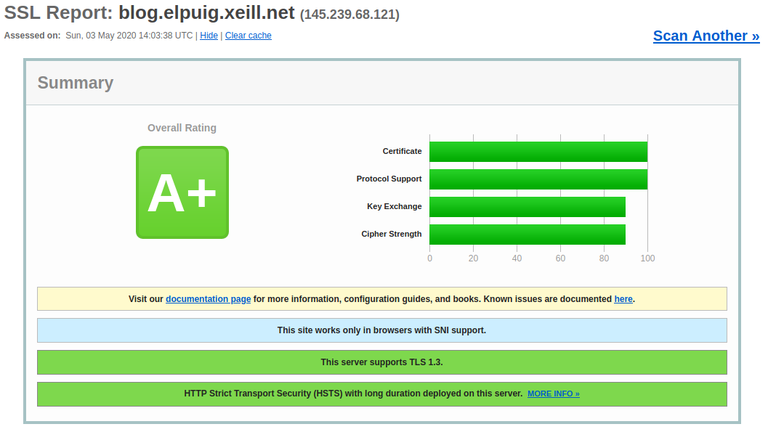Mozilla SSL Configuration Generator
 La configuración SSL/TLS de un servidor web requiere estar al día de las diferentes versiones del protocolo SSL/TLS, algoritmos de cifrado, tamaños de clave y otros detalles de los que dependerá que la conexión entre los clientes y el servidor sea segura.
La configuración SSL/TLS de un servidor web requiere estar al día de las diferentes versiones del protocolo SSL/TLS, algoritmos de cifrado, tamaños de clave y otros detalles de los que dependerá que la conexión entre los clientes y el servidor sea segura.
Utilizar una configuración poco estricta puede proporcionar una falsa sensación de seguridad y una configuración muy estricta puede dejar sin servicio a demasiados clientes.
Así pues ¿qué configuración SSL/TLS resulta razonable utilizar?
Esta es precisamente la cuestión que resuelve Mozilla SSL Configuration Generator. Una herramienta de Mozilla en la que indicando el servidor web utilizado se nos proporciona una configuración razonable para el mismo.
Configuración por defecto de Apache en Ubuntu 18.04
La configuración de Apache en Ubuntu 18.04 no obtiene una buena puntuación en el test de SSL Labs.

Porque se admiten conexiones con versiones antiguas del protocolo TLS:

La versión instalada de Apache es 2.4.29 y la configuración relacionada se encuentra en /etc/apache2/mods-enabled/ssl.conf:
<IfModule mod_ssl.c>
# Pseudo Random Number Generator (PRNG):
# Configure one or more sources to seed the PRNG of the SSL library.
# The seed data should be of good random quality.
# WARNING! On some platforms /dev/random blocks if not enough entropy
# is available. This means you then cannot use the /dev/random device
# because it would lead to very long connection times (as long as
# it requires to make more entropy available). But usually those
# platforms additionally provide a /dev/urandom device which doesn't
# block. So, if available, use this one instead. Read the mod_ssl User
# Manual for more details.
#
SSLRandomSeed startup builtin
SSLRandomSeed startup file:/dev/urandom 512
SSLRandomSeed connect builtin
SSLRandomSeed connect file:/dev/urandom 512
##
## SSL Global Context
##
## All SSL configuration in this context applies both to
## the main server and all SSL-enabled virtual hosts.
##
#
# Some MIME-types for downloading Certificates and CRLs
#
AddType application/x-x509-ca-cert .crt
AddType application/x-pkcs7-crl .crl
# Pass Phrase Dialog:
# Configure the pass phrase gathering process.
# The filtering dialog program (`builtin' is a internal
# terminal dialog) has to provide the pass phrase on stdout.
SSLPassPhraseDialog exec:/usr/share/apache2/ask-for-passphrase
# Inter-Process Session Cache:
# Configure the SSL Session Cache: First the mechanism
# to use and second the expiring timeout (in seconds).
# (The mechanism dbm has known memory leaks and should not be used).
#SSLSessionCache dbm:${APACHE_RUN_DIR}/ssl_scache
SSLSessionCache shmcb:${APACHE_RUN_DIR}/ssl_scache(512000)
SSLSessionCacheTimeout 300
# Semaphore:
# Configure the path to the mutual exclusion semaphore the
# SSL engine uses internally for inter-process synchronization.
# (Disabled by default, the global Mutex directive consolidates by default
# this)
#Mutex file:${APACHE_LOCK_DIR}/ssl_mutex ssl-cache
# SSL Cipher Suite:
# List the ciphers that the client is permitted to negotiate. See the
# ciphers(1) man page from the openssl package for list of all available
# options.
# Enable only secure ciphers:
SSLCipherSuite HIGH:!aNULL
# SSL server cipher order preference:
# Use server priorities for cipher algorithm choice.
# Clients may prefer lower grade encryption. You should enable this
# option if you want to enforce stronger encryption, and can afford
# the CPU cost, and did not override SSLCipherSuite in a way that puts
# insecure ciphers first.
# Default: Off
#SSLHonorCipherOrder on
# The protocols to enable.
# Available values: all, SSLv3, TLSv1, TLSv1.1, TLSv1.2
# SSL v2 is no longer supported
SSLProtocol all -SSLv3
# Allow insecure renegotiation with clients which do not yet support the
# secure renegotiation protocol. Default: Off
#SSLInsecureRenegotiation on
# Whether to forbid non-SNI clients to access name based virtual hosts.
# Default: Off
#SSLStrictSNIVHostCheck On
</IfModule>
La configuración recomendada por Mozilla SSL Configuration Generator
En Ubuntu 18.04 tenemos Apache 2.4.29 y OpenSSL 1.1.1. Con estas versiones Mozilla SSL Configuration Generator no permite la configuración Modern así que nos hemos de conformar con Intermediate:
# generated 2020-05-03, Mozilla Guideline v5.4, Apache 2.4.29, OpenSSL 1.1.1, intermediate configuration, no OCSP
# https://ssl-config.mozilla.org/#server=apache&version=2.4.29&config=intermediate&openssl=1.1.1&ocsp=false&guideline=5.4
# this configuration requires mod_ssl, mod_rewrite, and mod_headers
RewriteEngine On
RewriteRule ^(.*)$ https://%{HTTP_HOST}$1 [R=301,L]
SSLEngine on
# curl https://ssl-config.mozilla.org/ffdhe2048.txt >> /path/to/signed_cert_and_intermediate_certs_and_dhparams
SSLCertificateFile /path/to/signed_cert_and_intermediate_certs_and_dhparams
SSLCertificateKeyFile /path/to/private_key
# enable HTTP/2, if available
Protocols h2 http/1.1
# HTTP Strict Transport Security (mod_headers is required) (63072000 seconds)
Header always set Strict-Transport-Security "max-age=63072000"
# intermediate configuration
SSLProtocol all -SSLv3 -TLSv1 -TLSv1.1
SSLCipherSuite ECDHE-ECDSA-AES128-GCM-SHA256:ECDHE-RSA-AES128-GCM-SHA256:ECDHE-ECDSA-AES256-GCM-SHA384:ECDHE-RSA-AES256-GCM-SHA384:ECDHE-ECDSA-CHACHA20-POLY1305:ECDHE-RSA-CHACHA20-POLY1305:DHE-RSA-AES128-GCM-SHA256:DHE-RSA-AES256-GCM-SHA384
SSLHonorCipherOrder off
SSLSessionTickets off
Así que aplicando los cambios en el fichero /etc/apache2/mods-enabled/ssl.conf
<IfModule mod_ssl.c>
# Pseudo Random Number Generator (PRNG):
# Configure one or more sources to seed the PRNG of the SSL library.
# The seed data should be of good random quality.
# WARNING! On some platforms /dev/random blocks if not enough entropy
# is available. This means you then cannot use the /dev/random device
# because it would lead to very long connection times (as long as
# it requires to make more entropy available). But usually those
# platforms additionally provide a /dev/urandom device which doesn't
# block. So, if available, use this one instead. Read the mod_ssl User
# Manual for more details.
#
SSLRandomSeed startup builtin
SSLRandomSeed startup file:/dev/urandom 512
SSLRandomSeed connect builtin
SSLRandomSeed connect file:/dev/urandom 512
##
## SSL Global Context
##
## All SSL configuration in this context applies both to
## the main server and all SSL-enabled virtual hosts.
##
#
# Some MIME-types for downloading Certificates and CRLs
#
AddType application/x-x509-ca-cert .crt
AddType application/x-pkcs7-crl .crl
# Pass Phrase Dialog:
# Configure the pass phrase gathering process.
# The filtering dialog program (`builtin' is a internal
# terminal dialog) has to provide the pass phrase on stdout.
SSLPassPhraseDialog exec:/usr/share/apache2/ask-for-passphrase
# Inter-Process Session Cache:
# Configure the SSL Session Cache: First the mechanism
# to use and second the expiring timeout (in seconds).
# (The mechanism dbm has known memory leaks and should not be used).
#SSLSessionCache dbm:${APACHE_RUN_DIR}/ssl_scache
SSLSessionCache shmcb:${APACHE_RUN_DIR}/ssl_scache(512000)
SSLSessionCacheTimeout 300
SSLSessionTickets off
# Semaphore:
# Configure the path to the mutual exclusion semaphore the
# SSL engine uses internally for inter-process synchronization.
# (Disabled by default, the global Mutex directive consolidates by default
# this)
#Mutex file:${APACHE_LOCK_DIR}/ssl_mutex ssl-cache
# SSL Cipher Suite:
# List the ciphers that the client is permitted to negotiate. See the
# ciphers(1) man page from the openssl package for list of all available
# options.
# Enable only secure ciphers:
SSLCipherSuite ECDHE-ECDSA-AES128-GCM-SHA256:ECDHE-RSA-AES128-GCM-SHA256:ECDHE-ECDSA-AES256-GCM-SHA384:ECDHE-RSA-AES256-GCM-SHA384:ECDHE-ECDSA-CHACHA20-POLY1305:ECDHE-RSA-CHACHA20-POLY1305:DHE-RSA-AES128-GCM-SHA256:DHE-RSA-AES256-GCM-SHA384
# SSL server cipher order preference:
# Use server priorities for cipher algorithm choice.
# Clients may prefer lower grade encryption. You should enable this
# option if you want to enforce stronger encryption, and can afford
# the CPU cost, and did not override SSLCipherSuite in a way that puts
# insecure ciphers first.
# Default: Off
#SSLHonorCipherOrder on
SSLHonorCipherOrder off
# The protocols to enable.
# Available values: all, SSLv3, TLSv1, TLSv1.1, TLSv1.2
# SSL v2 is no longer supported
SSLProtocol all -SSLv3 -TLSv1 -TLSv1.1
# Allow insecure renegotiation with clients which do not yet support the
# secure renegotiation protocol. Default: Off
#SSLInsecureRenegotiation on
# Whether to forbid non-SNI clients to access name based virtual hosts.
# Default: Off
#SSLStrictSNIVHostCheck On
</IfModule>
Obtenemos una valoración mucho mejor:

